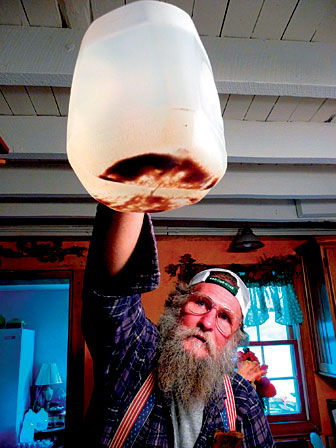Cow Deaths Have Couple Questioning Water Quality
Washington, PA Observer-Reporter
9 November 2009
By Christie Campbell, Staff Writer
chriscam@observer-reporter.com
DAISYTOWN - In the spring of 2008 after a fourth calf was born blind
and died soon after birth, Terry Greenwood took the unusual step of
purchasing a deep freezer for the carcass.
And there the carcass remains, waiting for someone to tell Greenwood
what killed it.

Could it be, as a representative from the state Department of
Environmental Protection told him, bad "farmer's luck?" Or could it be,
contrary to the industry's claims, that something used in the process
of drilling for natural gas contributed to the animal's death?
Terry and his wife, Kathy, did not own the gas rights to their property
in West Pike Run Township. Those were sold in 1921, allowing Dominion
Exploration and Production Inc. of Indiana, Pa., to drill on their farm.
In October 2007, the company received its permit from DEP to drill a
shallow vertical well - not in the Marcellus Shale - and operations
began in December.
A month later, as Kathy Greenwood began filling a pan with water to
make spaghetti, she noticed the water was cloudy. Her husband reported
it to the DEP the following day, and an inspector was immediately sent
to the farm.
What the DEP found were higher than normal levels of iron and manganese
in their drinking water. In an order dated March 27, 2008, the DEP
required Dominion to drill a new drinking well for the Greenwoods and
restore a water supply for farm operations.
Dan Donovan, a spokesman for Dominion, said the Greenwoods did not have
a water quality issue, but one of quantity. In addition to drilling the
couple a new drinking well, Dominion has submitted a plan to the DEP to
provide a water trough for cattle, he said. Currently, the company is
paying to have a 2,000-gallon water buffalo on the property filled
every four days to provide the farm's 35 head of cattle with water.
The Greenwoods had four separate water sources on their property: a
well and spring for the house and a spring and pond for cattle. While
water for human consumption is tested prior to drilling, other sources
are not, leaving Greenwood to wonder whether hydraulic fracturing
chemicals leached into a farm pond where his cows drank.
The Greenwoods lost 10 cows that year, including the four born blind
and one born with a cleft palate.
Donovan said the DEP found high levels of cow manure in the pond.
Nothing in the drilling process contaminated the pond, he said.
A DEP spokeswoman was unable to provide information on the pond
testing. Some diseases, such as bovine virus diarrhea, can affect fetal
calves during the gestational period, causing a number of birth
defects, including ocular ones.
Greenwood has since fenced off the pond so his livestock can no longer
drink from it, and the couple do not drink from their new water well
for fear it may be contaminated.
Greenwood receives some royalties from the gas drilling on his property
but says it does not make up for what he has lost.
"All this did was cost me money," Greenwood said. "We just went
backward."
